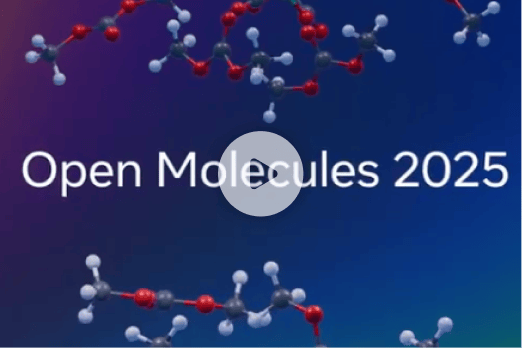Dear Readers,
After Google demonstrated the power of AI at its i/o conference, StabilityAI founder Emad came out of nowhere and unveiled the first open source agent that is also Sota! A milestone.
In addition, the first baby has now been treated with CRISPR in such a way that a previously serious disease can now be treated. More longevity news below.
Enjoy reading!
In Today’s Issue:
II-Agent: The open-source AI that's smarter and transparent
Talk to your spreadsheets? GenSpark AI Sheets makes it real
Meta drops the biggest chemistry dataset you've never heard of
Grok goes corporate: Musk’s edgy AI now wrapped in Microsoft SLAs
And more AI goodness…
All the best,

II-Agent - The first open source agent that is SOTA!
The TLDR
II-Agent is a next-gen open-source AI assistant that excels across research, coding, and data analysis, all while being fully transparent and auditable. It’s the core of the “Intelligent Internet” initiative aiming to empower humanity through open models and collaborative AI swarms. Unlike closed systems, II-Agent invites global participation in building safe, adaptable, and trustworthy autonomous systems.
The future of AI agents is here, but who really controls them? While closed-source giants such as Manus and GenSpark AI dominate the AI landscape, II-Agent is now taking center stage—and bringing a revolution with it!
This generalist is no ordinary AI assistant. II-Agent is a groundbreaking open-source framework that not only leads existing benchmarks, but is also completely transparent and auditable. Imagine an intelligent partner that supports you in every area, from complex research to precise code generation to in-depth data analysis. Powered by the robust Claude 3.7 Sonnet, II-Agent is the heart of the ambitious “Intelligent Internet” system, which aims to increase the intelligence of humanity through open models, datasets, and agent swarms.
For us as an AI community, this means freedom: we get a powerful tool whose inner workings we can understand, adapt, and improve together. It creates the essential foundation of trust for the use of AI in sensitive areas such as healthcare and education. Are you ready to help shape the infrastructure of an interoperable, accountable, and community-driven AI future? Let's make the world smarter!
Why it matters: II-Agent paves the way for trustworthy, transparent, and community-based AI development. It enables democratic participation in the design and use of autonomous systems that can transform our lives.
Ad
Prevent coupon abuse, protect your profits
KeepCart: Coupon Protection partners with D2C brands like Quince, Blueland, Vessi and more to stop/monitor coupon leaks to sites/extensions like Honey, CapitalOne, RetailMeNot, and more to boost your DTC margins
Overpaid commissions to affiliates and influencers add up fast - Get rid of the headache and revenue losses with KeepCart.
In The News
GenSpark’s AI Sheets Turns Spreadsheets Into Conversational Assistants
GenSpark AI Sheets is redefining how we interact with data by letting users talk directly to their spreadsheets. Simply upload a file, ask a question, and the system handles everything—from data cleaning to generating detailed reports and visualizations. It’s a seamless blend of AI magic and productivity that makes complex analysis feel effortless.
Meta Releases OMol25 and UMA to Supercharge Molecular Discovery
Meta has unveiled OMol25, the most comprehensive dataset of high-accuracy quantum chemistry calculations, and UMA, a machine learning model trained on over 30 billion atoms to enhance molecular predictions. Together, they offer powerful new tools to accelerate breakthroughs in materials science and molecular chemistry.
Microsoft Brings Grok AI to Azure with Enterprise Controls
Microsoft has integrated Elon Musk’s Grok 3 and Grok 3 mini models into its Azure AI Foundry, offering enterprise-grade access with service-level guarantees and stricter safeguards. Unlike the controversial versions on X, these models feature enhanced governance, customization, and content moderation tailored for professional use.
Graph of the Day

NMN as a promising treatment for Parkinson's disease
A brand-new preprint study (May 2025) shows that nicotinamide mononucleotide (NMN), a precursor of NAD+, can positively influence the pathological cascade of alpha-synuclein in Parkinson's mouse models. This opens up new perspectives for therapies against neurodegenerative diseases by targeting cellular energy and protein aggregation. In the future, this could lead to treatments that slow down or prevent Parkinson's disease, thereby significantly improving healthspan in old age.
Epigenome in motion
A Freiburg-Oxford team reveals that DNA methylation in mammalian cells is not a static clock, but pulsates as phase-locked oscillations along the chromatin. These “turnover waves” form synchronized domains that can be specifically stopped or reset. The study provides a physical model that opens up new approaches for rhythm-based rejuvenation therapies and heralds the next generation of epigenetic intervention strategies.
First customized CRISPR cure in vivo
Doctors in Philadelphia corrected a single mutation in a baby with a rare liver defect using lipid nanoparticle CRISPR directly in the body. The procedure reduced toxic ammonia and demonstrates the potential of personalized in vivo gene correction – a preview of scalable platforms for hundreds of rare diseases.
Question of the Day
Quote of the Day













